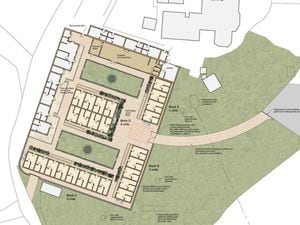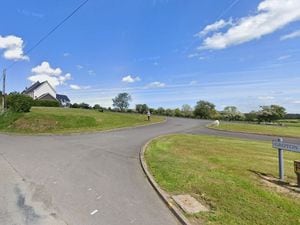Shrewsbury murder 'could not be predicted', says new report which reveals woman's killer heard voices in his head
A man who went on to murder a Shropshire woman had told mental health professionals he heard voices telling him to harm his neighbours, a report revealed today.
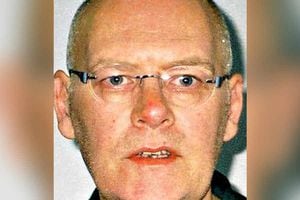
Steven Churchill stabbed Jane Edwards to death at her village home in December 2010.
In the summer before the murder, he told psychiatrists of two recent relapses, which were accompanied by "extremely violent imagery".
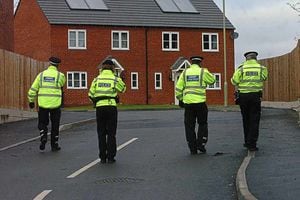
Churchill had already killed his sister in 1985 and went on to murder Miss Edwards at her home in Hanwood, near Shrewsbury.
An independent report into the circumstances of the 2010 murder today revealed a number of warning signs had emerged.
But it concluded the actions of Churchill could not have been predicted or prevented.
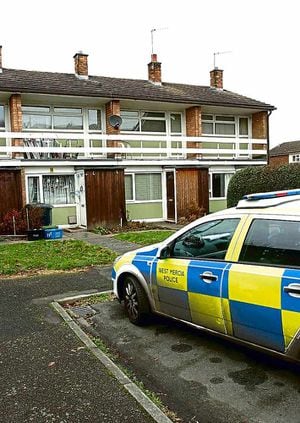
Today's report reveals Churchill's care team found a kitchen knife in the hallway of his Shrewsbury home a year before he killed Miss Edwards. When challenged on the knife he said it was for his own protection in case someone broke into his flat.
He became disturbed in the summer before Miss Edwards' murder, experiencing violent thoughts and in one case "locked himself in and would not open the door to people as he could not be certain he would not act on the commands".
But the report states: "We found no evidence in his words, actions or behaviour that could have alerted professionals that Churchill might become imminently violent, despite these vague threats."
The investigation, carried out for NHS England, has made several recommendations to South Staffordshire and Shropshire Healthcare NHS Foundation Trust.
The report, by experts Chris Brougham and Geoff Brennan, said: "We do not consider the killing of Jane Edwards was predictable. We found no words, actions or behaviour from Churchill in the weeks leading up to the killing that should have alerted his care team."
They added that Churchill made no specific threats to Miss Edwards, even though he had had opportunities to do so.
Churchill killed his sister in 1985 and was convicted of manslaughter due to diminished responsibility. He was released in 2003 and discharged from Home Office monitoring after a tribunal in 2006.
The killer, who lived at Stephenson Drive in Shrewsbury, stabbed Miss Edwards 52 times in what was described as a brutal and callous murder.
The 56-year-old claimed he murdered Miss Edwards because he believed God told him she was a witch.
Murderer heard voices in his head
On December 14, 2010, Jane Edwards welcomed what she thought was a friend into her Hanwood home for a meal to celebrate Christmas.
The shocking murder of Jane Edwards robbed a family of a woman they today described as "loving, kind-hearted and generous".
The family said they wanted their privacy respected as the report was published, but in a statement issued with the report said they wanted her to be remembered as the "person they loved and cherished".
Speaking following Steven Churchill's admission of murder in 2011, Miss Edwards' brother Clive told of the terrible impact on their lives, and particularly on her mother.
He said: "Steven Churchill is someone who killed a loving, kind-hearted and generous woman for his own means. He took away a daughter, a sister, an auntie and a dear friend to so many people.
"He took her away and has now left so many broken people behind. These are people who will remain broken.
"Steven Churchill did not just kill Jane that day, but he killed her mother, who continually asked after her daughter up until the day she died herself."
During Churchill's sentencing at Staffordshire Crown Court, Judge Justice Holroyd spoke of the harm visited on Miss Edwards' relatives.
He said: "
It is vividly stated by her brother, in a statement dated October 10 which I have read with care. It fell to him to discharge the awful duty of telling his elderly mother that her only daughter was dead."
Churchill, 56, who lived at Stephenson Drive, Shrewsbury, was sentenced to serve a minimum of 26 years in prison after admitting a charge of murder.
During the hearing Mr Roger Smith QC, prosecuting, said the Falklands War veteran became friends with Miss Edwards at Shelton Hospital in 2005 where both were volunteers.
He said Churchill planned the "frenzied" attack for two weeks and went armed with a knife to a Christmas meal at her Caradoc View flat in Hanwood on December 14, 2010.
He said: "He told police he was stabbing indiscriminately and she was shouting." Afterwards Churchill calmly poured himself a drink and had a cigarette before leaving.
However, unbeknown to Miss Edwards, the man she considered a friend, Steven Churchill, had been hatching a plan to kill his host because he believed God had told him she was a witch.
In 2011 Churchill was sentenced to spend a minimum of 26 years in jail after he admitted the shocking killing of Miss Edwards, during which he stabbed her 52 times. During a harrowing hearing it emerged that Churchill had killed before, having been convicted of manslaughter by diminished responsibility for an attack which killed his sister in 1985.
An independent investigation carried out for NHS England has concluded that Miss Edwards' murder could not have been predicted or prevented.
But the investigation, conducted to look at the care provided by the South Staffordshire and Shropshire mental health services, did outline two instances where Churchill had told mental health professionals of violent thoughts towards neighbours.
Despite those incidents the report concludes that there was "no evidence in his words, actions or behaviour that could have alerted professionals that Churchill might become imminently violent, despite these vague threats".
The report highlights the difficulty health professionals have in assessing risks posed by patients.
One of the accounts tells how in July 2010 Churchill had informed psychiatrists of "two recent episodes of relapse" saying they were accompanied with "extremely violent imagery". He said he had "locked himself in" and would not open the door to people because he could not be certain he would not act on the commands telling him to hurt them.
The investigators say that the admission posed a problem for the care team because it was retrospective, and Churchill appeared to have an understanding of his symptoms.
The report states: "The care team were in a difficult position because Churchill provided a retrospective account of his concerning symptoms. He displayed no symptoms at the time of his account. He would not have met the criteria for detention under the Mental Health Act at the meeting because he seemed well, with insight into his symptoms and was compliant with all treatment."
Other incidents were highlighted, including one where a care worker found a kitchen knife in the hallway of Churchill's Shrewsbury flat.
He told his care co-ordinator that "it was for personal protection against potential intruders".
In an earlier meeting Churchill had also told psychiatrists that the voices he heard were "changing from harming himself to harming others", and that the voices mentioned specific people.
During the conversation he named two of his neighbours and said the voices told him they were laughing at him and that he should harm them.
The report says he interpreted the voices as telling him to gather weapons but that he had not gone along with the voices "in any way".
A plan was put in place to address the situation, including increasing medication during key times when he was reminded of his first killing because they may trigger relapse.
The report considers South Staffordshire and Shropshire's role in providing care for Churchill but found that there was nothing which would have allowed his detention prior to the murder of Miss Edwards.
It states: "His care workers would have needed evidence of imminent self-harm or harm to others before they could have legally intervened and admitted him to hospital under the Mental Health Act."
It says Churchill did not present in a way that demonstrated he was suffering from "a mental disorder of a nature or degree that warranted detention in hospital for assessment" or that he should be detained in the interests of his own health or safety, or to protect others, before killing Jane Edwards.
The report also reveals that, despite his history of hearing voices, an assessment carried out after his arrest actually found that he was not suffering from a mental illness.
Report authors Chris Brougham and Geoff Brennan also found that care plans put in place for Churchill's treatment were appropriate.
Churchill's symptoms and reactions to medication were also described as "not typical of someone with psychosis", "because they seemed to happen in set patterns and were sensitive to medication."

